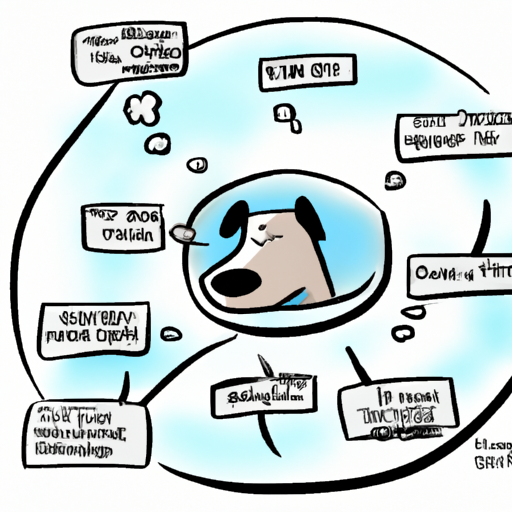As a caregiver, understanding your dog’s mind is crucial. It’s time to delve deeper into the inner workings of your furry friend’s mental processes.
1. Understanding Your Dog’s Behavior
Your dog’s behavior is a window into their mind. When they wiggle their tail, it’s not just a simple show of happiness. It’s a complex communication tool that reveals their emotional state.
Consider these common behaviors:
- Tail wagging: A wagging tail typically signifies happiness or excitement. However, the direction and speed of the wag can indicate different emotions.
- Barking: Dogs bark for various reasons, such as alerting to danger, expressing boredom, or seeking attention.
- Chewing: This could be a sign of stress, boredom, or teething in puppies.
2. The Canine Brain and Cognitive Processes
Dogs have cognitive processes similar to humans. They can learn, remember, and even solve problems.
Here’s a brief overview of the canine cognitive abilities:
- Memory: Dogs have both short-term and long-term memory. They can remember specific events, places, and people.
- Learning: Dogs learn through repetition and reinforcement. Training methods like positive reinforcement leverage this cognitive ability.
- Problem-solving: Dogs can solve simple problems, like figuring out how to get a treat out of a puzzle toy.
3. Emotional Intelligence in Dogs
Dogs are incredibly emotionally intelligent. They can detect human emotions and respond accordingly. If you’re sad, your dog might come over and nuzzle against you, providing comfort.
Consider these aspects of canine emotional intelligence:
- Empathy: Dogs can sense human emotions and often mirror them. This empathy makes them excellent companions.
- Emotional contagion: Dogs can catch human emotions. If you’re stressed, your dog might become anxious too.
4. The Effect of Training on Your Dog’s Mind
Training does more than teach your dog commands. It stimulates their mind, enhancing their cognitive abilities and increasing their mental agility.
Consider the following training benefits:
- Enhances memory and learning abilities
- Reduces behavioral problems
- Strengthens the bond between you and your dog
5. How Diet and Nutrition Affect Your Dog’s Mind
What your dog eats can affect their cognitive functions. A balanced diet rich in essential nutrients supports brain health and promotes mental agility.
Here’s a table showing the essential nutrients and their benefits:
| Nutrient | Benefit |
|---|---|
| Protein | Supports brain function and development |
| Fatty Acids | Promote healthy brain cells |
| Antioxidants | Protect against cognitive decline |
6. Toys and Games for Mental Stimulation
Toys and games are not just for physical exercise; they also provide mental stimulation. Puzzle toys, in particular, are excellent for challenging your dog’s problem-solving skills.
Here are some toys and games for mental stimulation:
- Puzzle toys
- Hide and seek games
- High-tech toys that engage your dog’s senses
7. Can Dogs Dream?
Yes, dogs can dream. They go through similar sleep stages as humans, including REM sleep, when dreaming occurs. If you see your dog twitching or making noises while sleeping, they’re likely dreaming.
8. FAQ
Q: Can dogs understand human language?
A: Dogs can understand basic commands and associate words with actions or objects. However, they don’t understand human language the way we do.
Q: Why does my dog follow me everywhere?
A: Dogs are social animals. They might follow you around because they enjoy your company, or they see you as their pack leader.
Q: How can I improve my dog’s mental agility?
A: Regular training, mental stimulation through toys and games, and a balanced diet can all contribute to your dog’s mental agility.
Q: Can dogs sense time?
A: While dogs don’t perceive time the same way humans do, they have a general sense of time. They can tell when it’s mealtime or walk time based on their internal body clock and routine cues.
Understanding your dog’s mind can strengthen your bond and help you cater to their needs better. So, keep observing, keep learning, and keep loving your furry friend.



